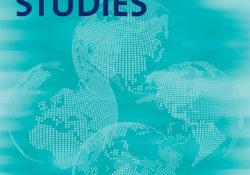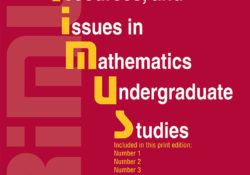eric.ed.gov har udgivet: Good teachers are essential for high-quality educational systems. However, little is known about teachers’ skills formation during college. By combining two standardized tests for Colombian students, one taken at the end of senior year in high school and the other when students are near graduation from college, this paper documents the extent to which education majors relatively improve or deteriorate their skills in quantitative reasoning, native language, and foreign language, in comparison to students in other programs. Teachers’ skills vis-à-vis those in other majors deteriorate in quantitative reasoning and foreign language, although they deteriorate less for those in math-oriented and foreign language oriented programs. For native language, there is no evidence of robust differences in relative learning mobility. An appendix contains Figure A1 and Tables A1 and… Continue Reading →
Like this:
Like Loading...
tandfonline.com har udgivet en rapport under søgningen “Teacher Education Mathematics”: ABSTRACT ABSTRACT The tension between academic and professional aims of engineering education is a remarkably consistent challenge facing engineering educators. Here, some historical roots of this issue are traced through the life and work of Carl Richard Söderberg (1895–1979), who emigrated from Sweden to the US for an illustrious industrial and academic career. While Söderberg was a proponent for a more science-based curriculum, his rationale was related to solving real professional problems, and he would come to criticise the distancing of engineering education from engineering practice. Söderberg’s views are compared to a present-day reform concept for engineering education, the CDIO approach, founded by MIT and three Swedish universities. The similarities show the persistence of the issue, as many of Söderberg’s… Continue Reading →
Like this:
Like Loading...
tandfonline.com har udgivet en rapport under søgningen “Teacher Education Mathematics”: Abstract Abstract The Mathematics Practicum has been offered at St. Olaf College for over 30 years. The Practicum is a 4-week, January Interim course where three teams of five students work on consulting problems solicited from area businesses, government agencies, and non-profit organizations. These problems have significant mathematical, statistical, and computational components. The projects end with a professional-quality student presentation at the client’s home office. This project-based, interdisciplinary, experience encourages problem solving, collaboration, inquiry, and communication skills. We discuss the logistics of the course, key factors that make this a positive experience for both the students and the sponsoring organizations, continuing challenges, and benefits to the students. Link til kilde
Like this:
Like Loading...
eric.ed.gov har udgivet: Research studies proved that teachers’ self-efficacy is directly related to students’ academic achievement and overall learning. The current study was conducted to explore relationship of mathematics teachers’ self-efficacy with students’ academic achievement at secondary level. A sample of 576 respondents with a break up of 96 math teachers (48 male and 48 female) and 480 students (240 male and 240 female) from six districts (Chakwal, Attock, Mianwali, Lahore, Leyyah and Muzaffar Garah) of the Punjab province. Academic score of the Students in the subject of mathematics was collected from relevant (BISE) documents. Pearson correlation was used to determine association between self-efficacy and academic achievement. Math male teachers’ self-efficacy and math female teachers’ self-efficacy was also compared on t-test assuming two sample having equal variances. No significant difference… Continue Reading →
Like this:
Like Loading...
tandfonline.com har udgivet en rapport under søgningen “Teacher Education Mathematics”: Abstract Abstract Previous studies found that girls have higher academic achievement than boys in most school subjects. Teachers’ grading of academic achievement seems to be based not only on students’ knowledge but also their social skills, and teachers tend to assess girls as having better social skills than boys. The main aim of this study was to examine through multilevel analysis the extent to which teacher-rated social skills predicted teacher-rated academic achievement in Norwegian, mathematics and English over two years when controlling for age, cultural background and previous academic achievement. Possible gender differences were also investigated. Few studies on student achievement in school subjects have included multiple grades, but this study included 1st–8th grade at time point 1 (TI) and… Continue Reading →
Like this:
Like Loading...
eric.ed.gov har udgivet: Core academic skills are essential for success in our society. However, an abundance of research has identified a large proportion of secondary school students are under performing in core academic areas such as literacy and math. Researchers have suggested integrating core academic content throughout all secondary coursework as a potential solution to students’ underperformance in core academics. This study focused on core academic integration in secondary agricultural education classrooms and explored a conceptual model for teachers’ core academic integration competence in the areas of math and literacy. Results indicated pedagogical competence and technical knowledge were significant predictors of teachers’ reading integration competence. Pedagogical competence was also a significant predictor of respondents’ writing and math integration competences. These findings highlight the importance of agriculture teachers’ ability to engage… Continue Reading →
Like this:
Like Loading...
eric.ed.gov har udgivet: The study provided a structural equation modeling (SEM) of school leaderships? views of school emphasis on academic success relative to students? performances in Trends in Mathematics and Science Study (TIMSS) 2015 in Science and Math in the United Arab Emirates (UAE). The school emphasis was reflected by teachers, parents, and students? priority and ambition for academic success. The school questionnaire items related to school leaders? perception of teachers, parents, and students were used for the analysis (13 items). Both exploratory factor analysis (EFA) and confirmatory factor analysis (CFA) were employed to construct the SEM. The SEM provided acceptable fit statistics with several significant paths. Results pointed to the significance of attitudes and behavior of teachers, parents, and students. There were significant paths from teachers to students, from… Continue Reading →
Like this:
Like Loading...


